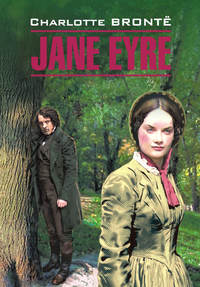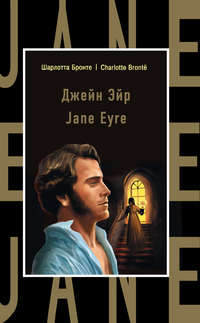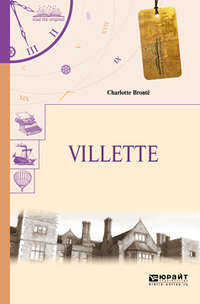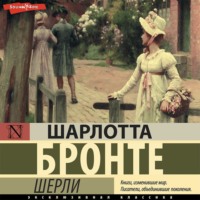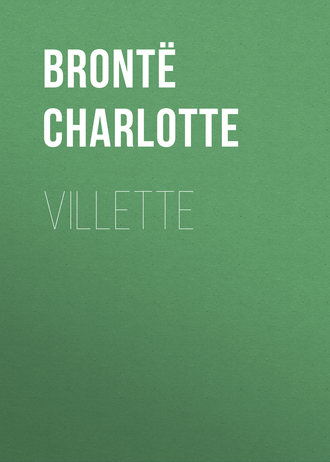 полная версия
полная версияVillette
The opinion of my Catholic acquaintance concerning my spiritual prospects was somewhat naïvely expressed to me on one occasion. A pensionnaire, to whom I had rendered some little service, exclaimed one day as she sat beside me: "Mademoiselle, what a pity you are a Protestant!"
"Why, Isabelle?"
"Parceque, quand vous serez morte – vous brûlerez tout de suite dans l'Enfer."
"Croyez-vous?"
"Certainement que j'y crois: tout le monde le sait; et d'ailleurs le prêtre me l'a dit."
Isabelle was an odd, blunt little creature. She added, sotto voce: "Pour assurer votre salut là-haut, on ferait bien de vous brûler toute vive ici-bas."
I laughed, as, indeed, it was impossible to do otherwise.
* * * * *Has the reader forgotten Miss Ginevra Fanshawe? If so, I must be allowed to re-introduce that young lady as a thriving pupil of Madame Beck's; for such she was. On her arrival in the Rue Fossette, two or three days after my sudden settlement there, she encountered me with very little surprise. She must have had good blood in her veins, for never was any duchess more perfectly, radically, unaffectedly nonchalante than she: a weak, transient amaze was all she knew of the sensation of wonder. Most of her other faculties seemed to be in the same flimsy condition: her liking and disliking, her love and hate, were mere cobweb and gossamer; but she had one thing about her that seemed strong and durable enough, and that was – her selfishness.
She was not proud; and —bonne d'enfants as I was – she would forthwith have made of me a sort of friend and confidant. She teased me with a thousand vapid complaints about school-quarrels and household economy: the cookery was not to her taste; the people about her, teachers and pupils, she held to be despicable, because they were foreigners. I bore with her abuse of the Friday's salt fish and hard eggs – with her invective against the soup, the bread, the coffee – with some patience for a time; but at last, wearied by iteration, I turned crusty, and put her to rights: a thing I ought to have done in the very beginning, for a salutary setting down always agreed with her.
Much longer had I to endure her demands on me in the way of work. Her wardrobe, so far as concerned articles of external wear, was well and elegantly supplied; but there were other habiliments not so carefully provided: what she had, needed frequent repair. She hated needle-drudgery herself, and she would bring her hose, &c. to me in heaps, to be mended. A compliance of some weeks threatening to result in the establishment of an intolerable bore – I at last distinctly told her she must make up her mind to mend her own garments. She cried on receiving this information, and accused me of having ceased to be her friend; but I held by my decision, and let the hysterics pass as they could.
Notwithstanding these foibles, and various others needless to mention – but by no means of a refined or elevating character – how pretty she was! How charming she looked, when she came down on a sunny Sunday morning, well-dressed and well-humoured, robed in pale lilac silk, and with her fair long curls reposing on her white shoulders. Sunday was a holiday which she always passed with friends resident in town; and amongst these friends she speedily gave me to understand was one who would fain become something more. By glimpses and hints it was shown me, and by the general buoyancy of her look and manner it was ere long proved, that ardent admiration – perhaps genuine love – was at her command. She called her suitor "Isidore: " this, however, she intimated was not his real name, but one by which it pleased her to baptize him – his own, she hinted, not being "very pretty." Once, when she had been bragging about the vehemence of "Isidore's" attachment, I asked if she loved him in return.
"Comme cela," said she: "he is handsome, and he loves me to distraction, so that I am well amused. Ca suffit."
Finding that she carried the thing on longer than, from her very fickle tastes, I had anticipated, I one day took it upon me to make serious inquiries as to whether the gentleman was such as her parents, and especially her uncle – on whom, it appeared, she was dependent – would be likely to approve. She allowed that this was very doubtful, as she did not believe "Isidore" had much money.
"Do you encourage him?" I asked.
"Furieusement sometimes," said she.
"Without being certain that you will be permitted to marry him?"
"Oh, how dowdyish you are! I don't want to be married. I am too young."
"But if he loves you as much as you say, and yet it comes to nothing in the end, he will be made miserable."
"Of course he will break his heart. I should be shocked and, disappointed if he didn't."
"I wonder whether this M. Isidore is a fool?" said I.
"He is, about me; but he is wise in other things, à ce qu'on dit. Mrs. Cholmondeley considers him extremely clever: she says he will push his way by his talents; all I know is, that he does little more than sigh in my presence, and that I can wind him round my little finger."
Wishing to get a more definite idea of this love-stricken M. Isidore; whose position seemed to me of the least secure, I requested her to favour me with a personal description; but she could not describe: she had neither words nor the power of putting them together so as to make graphic phrases. She even seemed not properly to have noticed him: nothing of his looks, of the changes in his countenance, had touched her heart or dwelt in her memory – that he was "beau, mais plutôt bel homme que joli garçon," was all she could assert. My patience would often have failed, and my interest flagged, in listening to her, but for one thing. All the hints she dropped, all the details she gave, went unconsciously to prove, to my thinking, that M. Isidore's homage was offered with great delicacy and respect. I informed her very plainly that I believed him much too good for her, and intimated with equal plainness my impression that she was but a vain coquette. She laughed, shook her curls from her eyes, and danced away as if I had paid her a compliment.
Miss Ginevra's school-studies were little better than nominal; there were but three things she practised in earnest, viz. music, singing, and dancing; also embroidering the fine cambric handkerchiefs which she could not afford to buy ready worked: such mere trifles as lessons in history, geography, grammar, and arithmetic, she left undone, or got others to do for her. Very much of her time was spent in visiting. Madame, aware that her stay at school was now limited to a certain period, which would not be extended whether she made progress or not, allowed her great licence in this particular. Mrs. Cholmondeley – her chaperon– a gay, fashionable lady, invited her whenever she had company at her own house, and sometimes took her to evening-parties at the houses of her acquaintance. Ginevra perfectly approved this mode of procedure: it had but one inconvenience; she was obliged to be well dressed, and she had not money to buy variety of dresses. All her thoughts turned on this difficulty; her whole soul was occupied with expedients for effecting its solution. It was wonderful to witness the activity of her otherwise indolent mind on this point, and to see the much-daring intrepidity to which she was spurred by a sense of necessity, and the wish to shine.
She begged boldly of Mrs. Cholmondeley – boldly, I say: not with an air of reluctant shame, but in this strain: —
"My darling Mrs. C., I have nothing in the world fit to wear for your party next week; you must give me a book-muslin dress, and then a ceinture bleu celeste: do– there's an angel! will you?"
The "darling Mrs. C." yielded at first; but finding that applications increased as they were complied with, she was soon obliged, like all Miss Fanshawe's friends, to oppose resistance to encroachment. After a while I heard no more of Mrs. Cholmondeley's presents; but still, visiting went on, and the absolutely necessary dresses continued to be supplied: also many little expensive etcetera– gloves, bouquets, even trinkets. These things, contrary to her custom, and even nature – for she was not secretive – were most sedulously kept out of sight for a time; but one evening, when she was going to a large party for which particular care and elegance of costume were demanded, she could not resist coming to my chamber to show herself in all her splendour.
Beautiful she looked: so young, so fresh, and with a delicacy of skin and flexibility of shape altogether English, and not found in the list of continental female charms. Her dress was new, costly, and perfect. I saw at a glance that it lacked none of those finishing details which cost so much, and give to the general effect such an air of tasteful completeness.
I viewed her from top to toe. She turned airily round that I might survey her on all sides. Conscious of her charms, she was in her best humour: her rather small blue eyes sparkled gleefully. She was going to bestow on me a kiss, in her school-girl fashion of showing her delights but I said, "Steady! Let us be Steady, and know what we are about, and find out the meaning of our magnificence" – and so put her off at arm's length, to undergo cooler inspection.
"Shall I do?" was her question.
"Do?" said I. "There are different ways of doing; and, by my word, I don't understand yours."
"But how do I look?"
"You look well dressed."
She thought the praise not warm enough, and proceeded to direct attention to the various decorative points of her attire. "Look at this parure," said she. "The brooch, the ear-rings, the bracelets: no one in the school has such a set – not Madame herself."
"I see them all." (Pause.) "Did M. de Bassompierre give you those jewels?"
"My uncle knows nothing about them."
"Were they presents from Mrs. Cholmondeley?"
"Not they, indeed. Mrs. Cholmondeley is a mean, stingy creature; she never gives me anything now."
I did not choose to ask any further questions, but turned abruptly away.
"Now, old Crusty – old Diogenes" (these were her familiar terms for me when we disagreed), "what is the matter now?"
"Take yourself away. I have no pleasure in looking at you or your parure."
For an instant, she seemed taken by surprise.
"What now, Mother Wisdom? I have not got into debt for it – that is, not for the jewels, nor the gloves, nor the bouquet. My dress is certainly not paid for, but uncle de Bassompierre will pay it in the bill: he never notices items, but just looks at the total; and he is so rich, one need not care about a few guineas more or less."
"Will you go? I want to shut the door… Ginevra, people may tell you you are very handsome in that ball-attire; but, in my eyes, you will never look so pretty as you did in the gingham gown and plain straw bonnet you wore when I first saw you."
"Other people have not your puritanical tastes," was her angry reply.
"And, besides, I see no right you have to sermonize me."
"Certainly! I have little right; and you, perhaps, have still less to come flourishing and fluttering into my chamber – a mere jay in borrowed plumes. I have not the least respect for your feathers, Miss Fanshawe; and especially the peacock's eyes you call a parure: very pretty things, if you had bought them with money which was your own, and which you could well spare, but not at all pretty under present circumstances."
"On est là pour Mademoiselle Fanshawe!" was announced by the portress, and away she tripped.
This semi-mystery of the parure was not solved till two or three days afterwards, when she came to make a voluntary confession.
"You need not be sulky with me," she began, "in the idea that I am running somebody, papa or M. de Bassompierre, deeply into debt. I assure you nothing remains unpaid for, but the few dresses I have lately had: all the rest is settled."
"There," I thought, "lies the mystery; considering that they were not given you by Mrs. Cholmondeley, and that your own means are limited to a few shillings, of which I know you to be excessively careful."
"Ecoutez!" she went on, drawing near and speaking in her most confidential and coaxing tone; for my "sulkiness" was inconvenient to her: she liked me to be in a talking and listening mood, even if I only talked to chide and listened to rail. "Ecoutez, chère grogneuse! I will tell you all how and about it; and you will then see, not only how right the whole thing is, but how cleverly managed. In the first place, I must go out. Papa himself said that he wished me to see something of the world; he particularly remarked to Mrs. Cholmondeley, that, though I was a sweet creature enough, I had rather a bread-and-butter-eating, school-girl air; of which it was his special desire that I should get rid, by an introduction to society here, before I make my regular début in England. Well, then, if I go out, I must dress. Mrs. Cholmondeley is turned shabby, and will give nothing more; it would be too hard upon uncle to make him pay for all the things I need: that you can't deny —that agrees with your own preachments. Well, but SOMEBODY who heard me (quite by chance, I assure you) complaining to Mrs. Cholmondeley of my distressed circumstances, and what straits I was put to for an ornament or two —somebody, far from grudging one a present, was quite delighted at the idea of being permitted to offer some trifle. You should have seen what a blanc-bec he looked when he first spoke of it: how he hesitated and blushed, and positively trembled from fear of a repulse."
"That will do, Miss Fanshawe. I suppose I am to understand that M. Isidore is the benefactor: that it is from him you have accepted that costly parure; that he supplies your bouquets and your gloves?"
"You express yourself so disagreeably," said she, "one hardly knows how to answer; what I mean to say is, that I occasionally allow Isidore the pleasure and honour of expressing his homage by the offer of a trifle."
"It comes to the same thing… Now, Ginevra, to speak the plain truth, I don't very well understand these matters; but I believe you are doing very wrong – seriously wrong. Perhaps, however, you now feel certain that you will be able to marry M. Isidore; your parents and uncle have given their consent, and, for your part, you love him entirely?"
"Mais pas du tout!" (she always had recourse to French when about to say something specially heartless and perverse). "Je suis sa reine, mais il n'est pas mon roi."
"Excuse me, I must believe this language is mere nonsense and coquetry.
There is nothing great about you, yet you are above profiting by the good nature and purse of a man to whom you feel absolute indifference.
You love M. Isidore far more than you think, or will avow."
"No. I danced with a young officer the other night, whom I love a thousand times more than he. I often wonder why I feel so very cold to Isidore, for everybody says he is handsome, and other ladies admire him; but, somehow, he bores me: let me see now how it is…"
And she seemed to make an effort to reflect. In this I encouraged her.
"Yes!" I said, "try to get a clear idea of the state of your mind. To me it seems in a great mess – chaotic as a rag-bag."
"It is something in this fashion," she cried out ere long: "the man is too romantic and devoted, and he expects something more of me than I find it convenient to be. He thinks I am perfect: furnished with all sorts of sterling qualities and solid virtues, such as I never had, nor intend to have. Now, one can't help, in his presence, rather trying to justify his good opinion; and it does so tire one to be goody, and to talk sense, – for he really thinks I am sensible. I am far more at my ease with you, old lady – you, you dear crosspatch – who take me at my lowest, and know me to be coquettish, and ignorant, and flirting, and fickle, and silly, and selfish, and all the other sweet things you and I have agreed to be a part of my character."
"This is all very well," I said, making a strenuous effort to preserve that gravity and severity which ran risk of being shaken by this whimsical candour, "but it does not alter that wretched business of the presents. Pack them up, Ginevra, like a good, honest girl, and send them back."
"Indeed, I won't," said she, stoutly.
"Then you are deceiving M. Isidore. It stands to reason that by accepting his presents you give him to understand he will one day receive an equivalent, in your regard…"
"But he won't," she interrupted: "he has his equivalent now, in the pleasure of seeing me wear them – quite enough for him: he is only bourgeois."
This phrase, in its senseless arrogance, quite cured me of the temporary weakness which had made me relax my tone and aspect. She rattled on:
"My present business is to enjoy youth, and not to think of fettering myself, by promise or vow, to this man or that. When first I saw Isidore, I believed he would help me to enjoy it I believed he would be content with my being a pretty girl; and that we should meet and part and flutter about like two butterflies, and be happy. Lo, and behold! I find him at times as grave as a judge, and deep-feeling and thoughtful. Bah! Les penseurs, les hommes profonds et passionnés ne sont pas à mon goût. Le Colonel Alfred de Hamal suits me far better. Va pour les beaux fats et les jolis fripons! Vive les joies et les plaisirs! A bas les grandes passions et les sévères vertus!"
She looked for an answer to this tirade. I gave none.
"J'aime mon beau Colonel," she went on: "je n'aimerai jamais son rival.
Je ne serai jamais femme de bourgeois, moi!"
I now signified that it was imperatively necessary my apartment should be relieved of the honour of her presence: she went away laughing.
CHAPTER X.
DR JOHN
Madame Beck was a most consistent character; forbearing with all the world, and tender to no part of it. Her own children drew her into no deviation from the even tenor of her stoic calm. She was solicitous about her family, vigilant for their interests and physical well-being; but she never seemed to know the wish to take her little children upon her lap, to press their rosy lips with her own, to gather them in a genial embrace, to shower on them softly the benignant caress, the loving word.
I have watched her sometimes sitting in the garden, viewing the little bees afar off, as they walked in a distant alley with Trinette, their bonne; in her mien spoke care and prudence. I know she often pondered anxiously what she called "leur avenir;" but if the youngest, a puny and delicate but engaging child, chancing to spy her, broke from its nurse, and toddling down the walk, came all eager and laughing and panting to clasp her knee, Madame would just calmly put out one hand, so as to prevent inconvenient concussion from the child's sudden onset: "Prends garde, mon enfant!" she would say unmoved, patiently permit it to stand near her a few moments, and then, without smile or kiss, or endearing syllable, rise and lead it back to Trinette.
Her demeanour to the eldest girl was equally characteristic in another way. This was a vicious child. "Quelle peste que cette Désirée! Quel poison que cet enfant là!" were the expressions dedicated to her, alike in kitchen and in schoolroom. Amongst her other endowments she boasted an exquisite skill in the art, of provocation, sometimes driving her bonne and the servants almost wild. She would steal to their attics, open their drawers and boxes, wantonly tear their best caps and soil their best shawls; she would watch her opportunity to get at the buffet of the salle-à-manger, where she would smash articles of porcelain or glass – or to the cupboard of the storeroom, where she would plunder the preserves, drink the sweet wine, break jars and bottles, and so contrive as to throw the onus of suspicion on the cook and the kitchen-maid. All this when Madame saw, and of which when she received report, her sole observation, uttered with matchless serenity, was:
"Désirée a besoin d'une surveillance toute particulière." Accordingly she kept this promising olive-branch a good deal at her side. Never once, I believe, did she tell her faithfully of her faults, explain the evil of such habits, and show the results which must thence ensue. Surveillance must work the whole cure. It failed of course. Désirée was kept in some measure from the servants, but she teased and pillaged her mamma instead. Whatever belonging to Madame's work-table or toilet she could lay her hands on, she stole and hid. Madame saw all this, but she still pretended not to see: she had not rectitude of soul to confront the child with her vices. When an article disappeared whose value rendered restitution necessary, she would profess to think that Désirée had taken it away in play, and beg her to restore it. Désirée was not to be so cheated: she had learned to bring falsehood to the aid of theft, and would deny having touched the brooch, ring, or scissors. Carrying on the hollow system, the mother would calmly assume an air of belief, and afterwards ceaselessly watch and dog the child till she tracked her: to her hiding-places – some hole in the garden-wall – some chink or cranny in garret or out-house. This done, Madame would send Désirée out for a walk with her bonne, and profit by her absence to rob the robber. Désirée proved herself the true daughter of her astute parent, by never suffering either her countenance or manner to betray the least sign of mortification on discovering the loss.
The second child, Fifine, was said to be like its dead father. Certainly, though the mother had given it her healthy frame, her blue eye and ruddy cheek, not from her was derived its moral being. It was an honest, gleeful little soul: a passionate, warm-tempered, bustling creature it was too, and of the sort likely to blunder often into perils and difficulties. One day it bethought itself to fall from top to bottom of a steep flight of stone steps; and when Madame, hearing the noise (she always heard every noise), issued from the salle-à-manger and picked it up, she said quietly, – "Cet enfant a un os cassé."
At first we hoped this was not the case. It was, however, but too true: one little plump arm hung powerless.
"Let Meess" (meaning me) "take her," said Madame; "et qu'on aille tout de suite chercher un fiacre."
In a fiacre she promptly, but with admirable coolness and self-possession, departed to fetch a surgeon.
It appeared she did not find the family-surgeon at home; but that mattered not: she sought until she laid her hand on a substitute to her mind, and brought him back with her. Meantime I had cut the child's sleeve from its arm, undressed and put it to bed.
We none of us, I suppose (by we I mean the bonne, the cook, the portress, and myself, all which personages were now gathered in the small and heated chamber), looked very scrutinizingly at the new doctor when he came into the room. I, at least, was taken up with endeavouring to soothe Fifine; whose cries (for she had good lungs) were appalling to hear. These cries redoubled in intensity as the stranger approached her bed; when he took her up, "Let alone!" she cried passionately, in her broken English (for she spoke English as did the other children). "I will not you: I will Dr. Pillule!"
"And Dr. Pillule is my very good friend," was the answer, in perfect English; "but he is busy at a place three leagues off, and I am come in his stead. So now, when we get a little calmer, we must commence business; and we will soon have that unlucky little arm bandaged and in right order."
Hereupon he called for a glass of eau sucrée, fed her with some teaspoonfuls of the sweet liquid (Fifine was a frank gourmande; anybody could win her heart through her palate), promised her more when the operation should be over, and promptly went to work. Some assistance being needed, he demanded it of the cook, a robust, strong-armed woman; but she, the portress, and the nurse instantly fled. I did not like to touch that small, tortured limb, but thinking there was no alternative, my hand was already extended to do what was requisite. I was anticipated; Madame Beck had put out her own hand: hers was steady while mine trembled.
"Ca vaudra mieux," said the doctor, turning from me to her.



